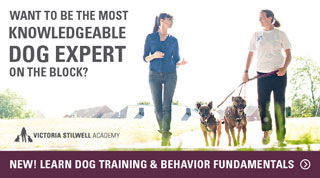I have a dog who I have been training using +R (mainly with treats) for the past several months. I had done a lot of research on dog training through books, videos, and articles; but none of the trainers (Andrea Arden, Dr. Ian Dunbar, Emily Larlham, Karen Pryor, other clicker trainers) I have been following go into depth much about phasing out the use of treats. I am having an extremely difficult time becoming independent from the use of "cookie bribery," and my dog will only do what I ask when she thinks
a) I have a treat bag clipped onto my belt
b) there are treats nearby (in a jar or bag on a shelf)
c) there are treats in my pockets
d) it is her mealtime
e) I have a treat in my hand. Sometimes I will pretend I have a food reward in my hand and use my hand as a lure.
For all of the above, she will respond to a command once but if she realizes that she will not get a treat, she will not listen to any other commands I give her and will instead begin barking like a maniac. I have to end up taking smelly chicken in my pockets to the dog park and when we go on walks in order to be assured that she will listen. She is very attentive to my actions and can almost always tell whether or not there is food on me. She has absolutely no interest in toys, so I can't really reward her with play. I really hate the idea of bribing my dog all the time for her to do what I want. This would be especially true in the instance of an emergency.
When she barks in demand for food after she realizes she is not going to get a treat, I try to ignore her and wait for calm, quiet behavior to award with my attention. This does work, but only somewhat. It takes ages for her to calm down, sending my stress levels through the roof
Her barking really is a problem, she barks almost constantly when she wants food or get excited or if there are squirrels in the yard. She is also very reactive on walks when I don't have food tidbits in hand. It's obviously very self-rewarding for her, but I have no way to control it. Putting her on a leash and tying her to me doesn't help. Crating her often doesn't help. And Kong toys only last so long. I've tried teaching "quiet" which she picked up fairly quickly but once again, no treat, no compliance.
I've tried using "life rewards" such as permission to get up on furniture or to be let out, but when I give the command she almost seemingly glares at me and takes very long to respond, often well over five seconds. When I use treats, she responds in half a second, so I am sure she knows what I am asking.
This is probably an important factor: I have never "corrected" my dog, with either physical force or a voice correction. I have never told her "no." I had learned that it just leads to confusion and nothing more than abuse, and that I should reward my dog for doing good behavior rather than correcting the bad behavior. This obviously has become a problem; my dog is now equivalent to a brat.
I have tried proofing behaviors, making her do more than one command for a treat, and using life rewards - but the chances of my dog obeying me in those circumstances are about 1 out of 10.
She gets very excited/agitated around food, no matter what kind of food it is or how much there is. I have also tried the technique where you prepare the dog's meal ahead of mealtime and place the food in front of her when she is calm, lying down, and not thinking about food. I have noticed no change in the dog's excitement towards food.
So, I have quite a few questions:
1. How can I phase out the use of treats?
2. Should I ever correct my dog, and how should I do it?
3. Why not use a "scruff shake?"
4. Why is there such a bad rap with slip collars/choke chains? Would a partial check collar be more acceptable? (Picture of a partial check: http://www.canis-equus.co.uk/product/view/28)
5. How can I teach quiet without the aid of food?
6. How can I get my dog interested in toys?
7. What do you think about the being-the-pack-leader theory, and why?
8. It has been said that you should always follow up a "no" or "ah-ah" with a consequential action. What action should this be?
9. How can I get my dog to listen to me in distracting environments (preferably w/o treats)?
Thank you for your time and response

